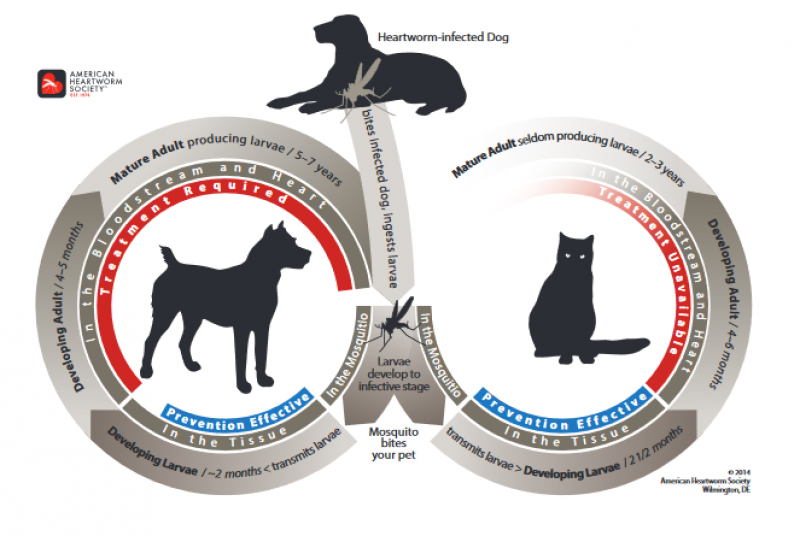Heartworm Disease
The warm weather brings barbecues and the opportunity to enjoy the great outdoors without getting too cold. Unfortunately, it also brings mosquitos. While this is not too much of a problem in the New England area, if you travel with your dog, prevention should be something you consider.
These little biting insects are a nuisance to us but can be much more dangerous to our pets. They spread heartworms, a parasite that can cause lung disease and heart failure. While the wide range of preventative products available today mean that heartworm disease isn’t as common as it once was, it’s still a significant risk to a pet’s health and in fact, their life.
The mosquito is an essential part of the heartworm lifecycle. They survive on blood and when they bite an infected dog and drink their blood, they also take up the immature worms. These worms then develop further in the mosquito’s body before being transferred to another dog as they feed. Without mosquitos there is no spread of heartworm between dogs.
The immature worms grow into adults and make their home in a dog’s heart and in the arteries leading to their lungs. It can take several years for dogs to show symptoms of heartworm disease, so owners won’t notice when their pet first becomes infected. Often the first sign is a soft cough but if the condition isn’t diagnosed and treated, dogs develop lethargy, rapid breathing and fluid accumulation in their abdomen. Ultimately, they may collapse. Heartworm disease can also affect cats. Again, symptoms include coughing and weight loss. If you share your life with a ferret, they too are at risk of heartworm disease. Heartworm infection is detected in dogs and ferrets with a simple blood test however it’s not quite so straightforward in cats. There are a number of conditions that cause similar symptoms in cats and blood tests are less accurate in this species.
Heartworm can be fatal. Treatment of heartworm disease in dogs can be complicated and for our feline friends, there is no safe way of killing the adult worms. Treatment of heartworm disease in cats is aimed at controlling symptoms. Fortunately, there are a number of products that will prevent a pet from developing the disease. These products don’t stop infection with the worms, but they kill the immature parasites before they become adults and cause damage to the heart and lungs. Some products just control heartworm while others also kill multiple parasites including fleas, ticks and intestinal worms. If your pet doesn’t like the idea of taking a tablet, then you may prefer to use a spot on liquid that’s applied to the back of the neck.
Heartworm is a serious and potentially fatal disease, but it can be avoided. We would be happy to show you the range of products available to control heartworm. We can help you choose a product that is easy for you to use and easy to remember and show you how to use it correctly. Don’t let your pet fall victim to a preventable disease.

